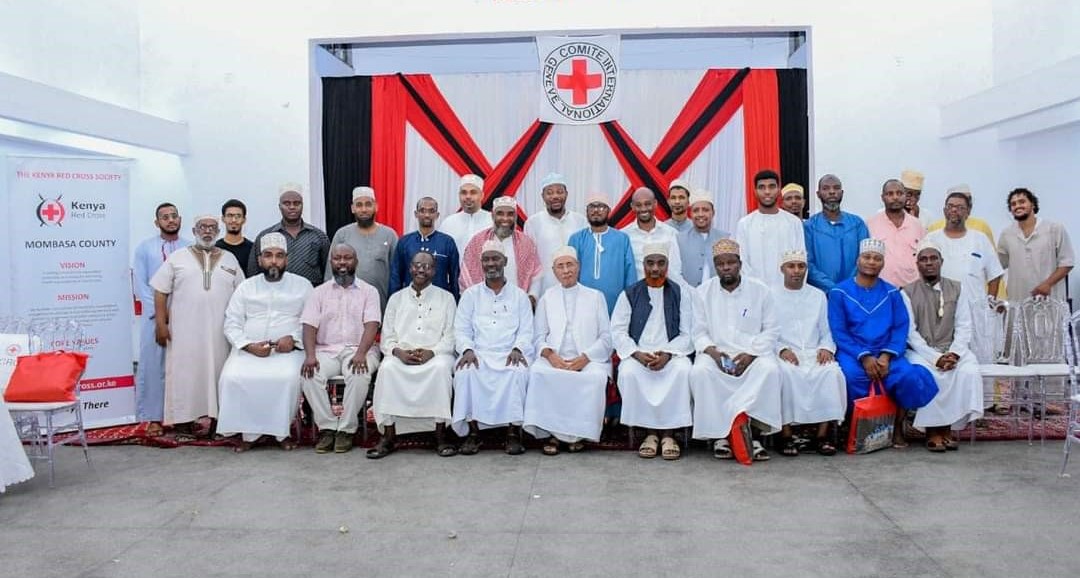The ICRC Nairobi Regional Delegation organised three Iftar dinners for community leaders from counties bordering Somalia that are impacted by the conflict in the war-torn country. The first Iftar was held on 1 April in Mombasa where 45 Muslim scholars, clerics, university lecturers and government officials attended. The Iftar was graced by the Governor of Mombasa Abdulswamad Sharrif Nassir and the Chairman of the recently formed Kenya Fatwa Council (KENFAT) Sheikh Ahmed Ahmed Badawi Jamalilayl.
Speaking during the Iftar dinner, Sheikh Jamalilayl appealed to Muslims in Kenya to “read about the history of the founder of Red Cross and its operations in the country” in order to familiarize themselves with the organization. Indeed, many Muslims in the areas where the ICRC and national society work, especially in Lamu, Garissa, Mandera and Wajir along the Kenya-Somalia border, misperceive the Red Cross as a Christian organization with a hidden Western agenda to convert Muslims into Christianity.

Mombasa Governor Abdulswamad Shariff Nassir in talks with Chairman of the Kenya Fatwa Council Sheikh Ahmad Ahmed Badawi Jamalilyal during the Iftar in Mombasa
Sheikh Jamalilayl said, “I don’t believe that the Red Cross is a religious entity despite having the Red Cross as its sign [emblem]. Up to now its operations are purely humanitarian and those operations do not represent any religion in any way. For instance, here at the [Kenya] Red Cross Mombasa branch, if you look at the board, the chairman and secretary are all Muslims, we can say there is a mixture of Muslims and non-Muslims. I want Muslim brothers to understand that the Red Cross is not a religious organization, but purely a humanitarian organization.”
Sheikh Jamalilayl also praised the ICRC and Red Cross movement for organizing the Iftar for Muslim scholars and clerics in the region, explaining that “one of the biggest benefits of Ramadan is to invite one another for Iftar. People meet each other, advise one another and make a point to understand the objective of these kind of invitations. We thank the Red Cross for inviting us here today.”
Iftar is said to bring blessings, especially for those who organize it and invite others. This is widely regarded by Muslims as an act of kindness that Allah favors immensely. Muslims believe that Allah opens the gates of forgiveness for anyone who provides fast observers with Iftar, and that one who provides a fast observer with a glass of water during Iftar will be granted access to Allah’s fountain and never experience thirst again.

Mombasa Governor Abdulswamad Shariff Nassir receives an Islamic prayer mat and scarf from the Kenya Red Cross Society Mombasa Board Chairman Mahmoud Noor during the Iftar dinner
Iftar dinners were also held in Lamu and Garissa counties. The Iftar dinner in Garissa was attended by 30 Muslim scholars, clerics, representatives of NGOs, government officials and professionals, including the Speaker of Garissa County Assembly, the Honourable Abdi Idle Gure, and Deputy County Commissioner Solomon Chesut. The Honourable Abdi Idle Gure welcomed the ICRC to Garissa and appealed for more humanitarian assistance to the areas bordering Somalia following the effects of the devastating drought over the past four years. 40 Muslim scholars and clerics from Lamu Island attended a second Iftar dinner in the area, where the Chairman of the Council of Imams and Preachers of Kenya thanked the ICRC and the Kenya Red Cross Society Lamu Branch for organizing the event.
Why ICRC organizes Iftars
The ICRC develops contacts with religious scholars and actors around the world who can help reduce suffering during armed conflict and other situations of violence. The primary objective is to reinforce mutual understanding, thereby overcoming misperceptions and enhancing respect for human dignity. For these reasons, the ICRC and Kenya Red Cross Society have reached out in recent years to religious and community leaders in many of the areas where they work, especially in the coastal and northeastern regions of Kenya close to the border with Somalia. These exchanges include discussions on subjects such as commonalities between Islamic teachings and international humanitarian law (IHL), as well as on pressing humanitarian concerns, such as access to victims of armed conflict, and the protection of health workers, medical facilities, the sick and wounded.

